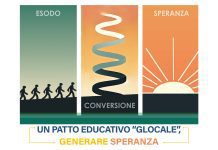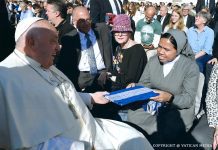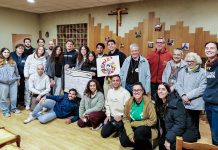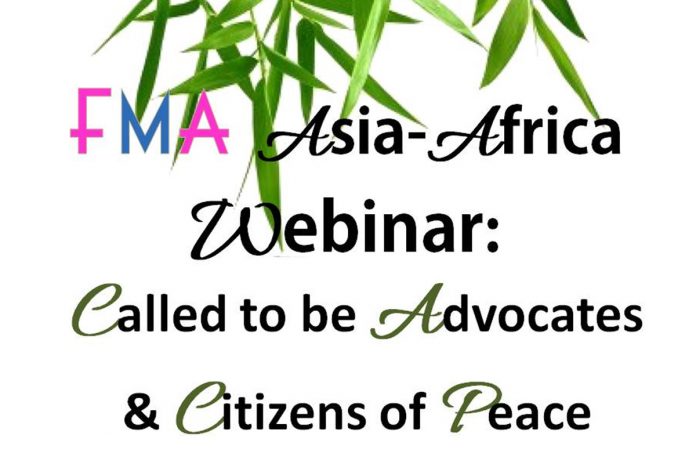Asia and Africa. On 4 June 2022, the Webinar organized by the Salesian Institutions of Higher Education (ISS – FMA) of Asia and Africa took place on the theme “Called to be advocates and citizens of peace”. The event was attended by Daughters of Mary Help of Christians, University teachers, students, members of the Educating Communities, and the Salesian Family from India, the Philippines, Africa, and Japan.
The choice of theme derives from the context of intensified conflicts and violence in the world. As Salesian educational Institutions, it is necessary to educate young people to be supporters of building a culture of peace, in harmony with the principles of the Church’s Social Doctrine and with the Sustainable Development Goal 16 of the United Nations 2030 Agenda (SDG16), which aims to promote peaceful and inclusive societies.
The Webinar began with an opening prayer led by students from Mary Help of Christians College in Laguna, Philippines.
The Mother General of the Institute of the Daughters of Mary Help of Christians, Sr. Chiara Cazzuola, through a video, then greeted the participants wishing them a good meeting and referring to the theme said:
“We are aware that peace is built through small and concrete gestures, in the patient commitment of every day, nourishing one’s heart with positive feelings. This is an effective contribution to the formation process of ‘good Christians and honest citizens’ according to the educational goal of Don Bosco and Mother Mazzarello…
Don Bosco and Mother Mazzarello left us a charism, today more relevant than ever, which passes through education and is capable of transforming the life of people and of society. Good Christians and honest citizens is a powerful synthesis: living citizenship and citizenship in solidarity can transform and improve our society”.
Subsequently, Sr. Asela Chavez, FMA of the Philippine Province St. Mary D. Mazzarello (FIL), Dean of Mary Help of Christians College in Laguna, introduced the speaker, Fr. Eligio Cruz, Salesian of Don Bosco, former Provincial of St. John Bosco Province of the Northern Philippines (FIN).
In the first part of his presentation, he spoke of peace from the perspective of the Beatitudes. The Beatitudes are Christ’s answer to all those who suffer and the manifestation of God’s love which transforms death into life. The call is to live the Beatitudes as disciples and the challenge is to let the Beatitudes renew the earth, with the certainty that “there is no peace if we leave God aside” (Pope Benedict XVI).
The presenter then spoke of the Daughters of Mary Help of Christians as builders of peace. Mother Mazzarello was a leader in building peace. From a young age she did not seek command, rather she manifested the ability to walk with people and she never shunned anyone because of antipathy. As a Daughter of Mary Immaculate, she grew in self-control and inner serenity. As Co-founder of the FMA Institute, she had the ability to correct and obtain collaboration, to bring out the best in others, and to bring them back on the right track.
He also recalled that the FMA are educators to peace, committed to educating young people to be active and critical people, builders of a renewal that promotes justice, love, truth, and freedom. The educational commitment, inspired by the social teaching of the Church, translates into programs of formation for peace, democracy, and political participation that promotes the common good (see Guidelines for the FMA Educational Mission). He also reiterated that the FMA are experts in encounter, that the prophecy of the encounter will be the contribution, as FMA, to an educational mission at the service of life (Mother Antonia Colombo, Acts of GC XX pp. 134, 137).
In the last part of the report, entitled “Let’s educate in the ways of peace,” Fr. Eligio Cruz mentioned some current issues related to the increase in violence, which require preventive and recovery systems, for example through online services and reception services and protection of the person. He also addressed the issue of the crisis of truth and fake news, recalling the importance of being critical of information and news, which often feed the culture of hatred. In this regard, he highlighted the need to enter the new digital culture with intelligence and competence, to help young people to live it in a critical and creative way.
Sr. Runita Borja, General Councilor for Youth Ministry of the FMA Institute, concluded the Webinar by saying that change begins with an ever-greater awareness of oneself, of the communities, of families. She also reiterated her convictions that without peace human progress will not be possible and that at the basis of peace there is the recognition that every human person is in the image and likeness of God. Finally, she encouraged the participants, especially young people, to have a big heart, capable of welcoming, of recognizing needs, and of respecting the dignity of every human person.
The event ended with thanks from Sr. Leilani Baranao, Dean of Mary Help of Christians Institute for Women in Cebu, Philippines, and with the final prayer.




















